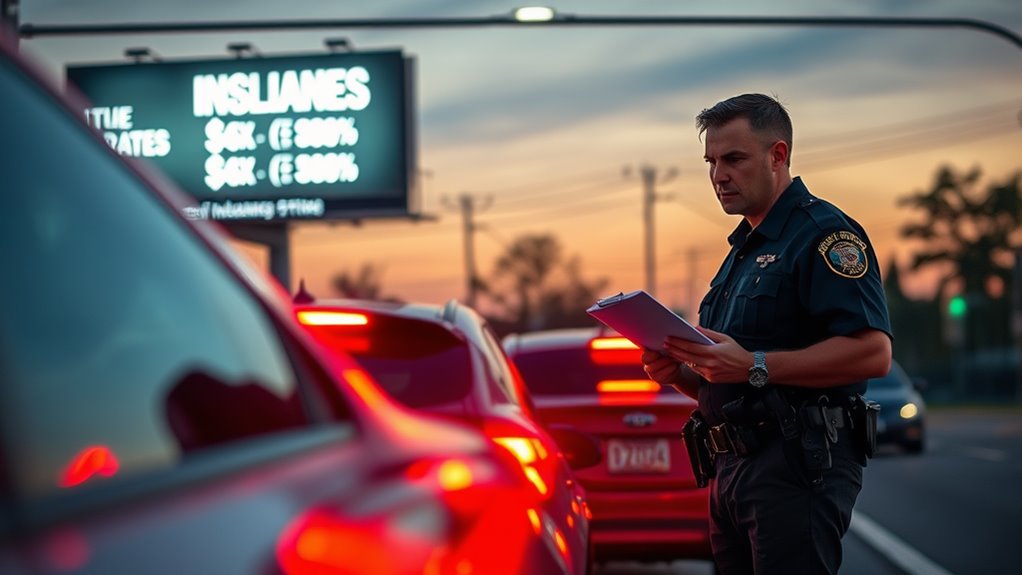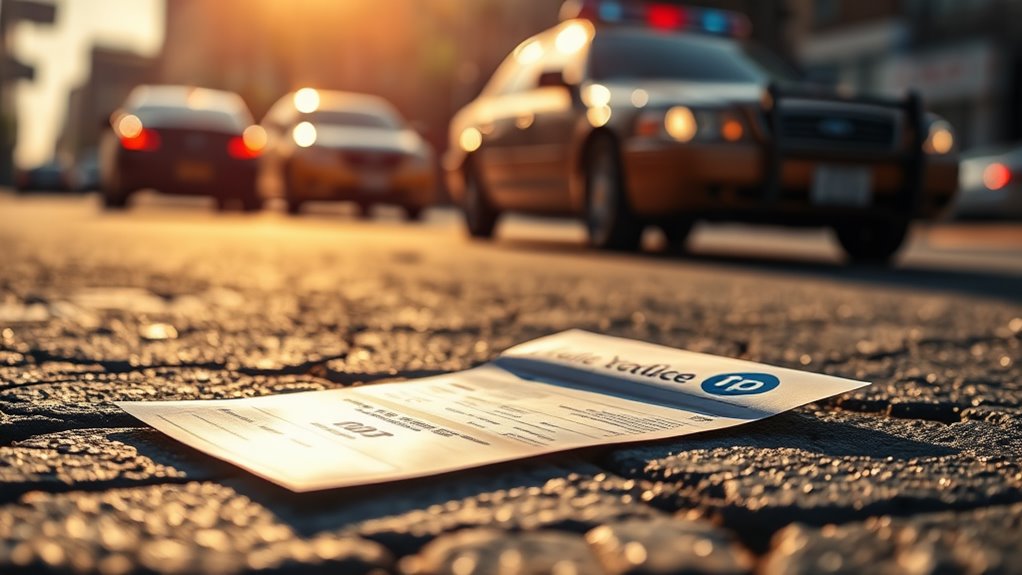Picture yourself standing before a judge, armed with evidence and a solid defense against a minor traffic ticket. Contesting such tickets can save you money and keep your driving record clean. By employing the right strategies, you can increase your chances of a favorable outcome. What steps should you take to effectively challenge your ticket? Let's explore the best ways to navigate this process successfully.
Key Takeaways
- Gather and analyze all relevant evidence, including documentation and witness statements, to build a compelling case against the ticket.
- Understand local traffic laws and regulations to identify possible defenses and any errors in the ticket issuance.
- Consult with traffic attorneys to gain specialized insights and develop a strong defense strategy tailored to your situation.
- Prepare thoroughly for court by organizing evidence, rehearsing your presentation, and anticipating questions from the judge and prosecution.
- Maintain professionalism and composure during court proceedings, focusing on clear communication of your key arguments.
Gather All Relevant Documents
When contesting a traffic ticket, gathering all relevant documents is essential to building a strong case. Start by securing your original citation and any courtesy notices.
You'll also need your vehicle registration, identification, and current insurance documents. If you've attended traffic school, include those records as well. Next, collect any prior driving records that may support your case. It's important to have a traffic lawyer on your side, as they can provide valuable insights into the process and help strengthen your defense.
Don't forget to obtain witness contact information and secure their statements to bolster your argument. Document the incident location with photographs, videos, and maps, noting conditions like weather and roadwork. Additionally, be aware that a trial by written declaration allows you to submit your defense in writing if you choose that route.
Finally, maintain a record of correspondence with the court and the issuing officer. By organizing these documents effectively, you'll strengthen your position and improve your chances of successfully contesting the ticket.
Familiarize With Traffic Laws
After gathering all relevant documents, it's important to understand the traffic laws that apply to your case. Familiarizing yourself with these laws not only helps you avoid violations but also strengthens your argument when contesting a ticket.
Each state has its own traffic code, defining rules like right of way, speed limits, and traffic signals. Knowing these details will empower you to challenge the ticket effectively. For instance, if you're accused of running a red light, understanding the specific traffic signal laws in your area can aid your defense.
In addition, being well-versed in traffic laws promotes safer driving habits, potentially reducing your insurance premiums and minimizing the risk of future tickets. Stay informed and drive safely!
Consult Legal Experts
Consulting legal experts can greatly enhance your chances of successfully contesting a traffic ticket. Traffic attorneys possess specialized knowledge of laws and regulations that can considerably impact your case.
They'll help you organize evidence effectively, build a strong defense, and negotiate with prosecutors to potentially reduce fines or charges. With their guidance, you'll navigate court procedures smoothly, minimizing procedural errors.
Legal experts can evaluate the seriousness of your violation and assess the best defense strategies. They know how to challenge the officer's evidence and are familiar with local court processes.
Engaging an attorney might seem costly initially, but their expertise can prevent future financial burdens, protect your driving privileges, and ultimately save you money in the long run.
Analyze the Ticket
To effectively contest your traffic ticket, start by carefully analyzing the ticket itself. This initial step can reveal critical information that may help your case.
Begin by thoroughly analyzing your traffic ticket, as it may contain vital information to bolster your defense.
- Check Ticket Information: Verify your name, address, and vehicle details are accurate.
- Understand Violation Details: Familiarize yourself with the specific charges and the relevant traffic laws.
- Look for Errors or Omissions: Identify any mistakes, such as misspellings or incorrect dates, which could weaken the ticket's validity.
Taking the time to thoroughly analyze the ticket can provide you with a solid foundation for building your defense.
Identify Legal Defenses
Once you've analyzed your ticket, the next step is to identify potential legal defenses that can bolster your case.
Start by challenging the officer's testimony; if you have evidence that contradicts their account, it can be pivotal. Consider the mistake of fact versus law; an honest mistake might mitigate your liability.
Look for technicalities or citation errors that could invalidate the ticket. If you acted out of necessity to avoid greater harm, that defense could apply too.
Familiarize yourself with local traffic laws, as knowing specific regulations can strengthen your argument.
Finally, reviewing similar past cases can provide insights into effective strategies that have worked before.
Document Historical Context
As you prepare to contest a traffic ticket, understanding the historical context of traffic laws can provide valuable insights into your case.
Traffic regulations have evolved considerably since their inception in the 1920s, driven by the need for public safety as roadways expanded. Familiarizing yourself with this background can strengthen your argument.
Consider these points:
- Early Regulations: The first speed law in the U.S. set limits at just 12 mph, reflecting the nascent stage of vehicle technology.
- Enforcement Challenges: Speed limits were hard to enforce without today's advanced technology.
- Impact on Society: Historical laws shaped public perception and compliance, influencing how current regulations are viewed.
Understanding this context can bolster your defense and highlight the evolution of traffic enforcement.
Review Officer's Notes
Reviewing the officer's notes is a crucial step in contesting a traffic ticket, as these documents can reveal inconsistencies and bolster your defense. Through the discovery process, you can request these notes from law enforcement agencies or traffic courts.
Scrutinizing the notes helps you prepare an effective defense strategy by identifying discrepancies in the officer's testimony. If inconsistencies arise, you can highlight them during cross-examination, challenging the credibility of the prosecution's case.
Additionally, evaluating the notes allows you to assess the strength of the evidence against you, pinpointing weaknesses that can be exploited.
Don't underestimate the power of thorough research; it can make a significant difference in the outcome of your case.
Collect Witness Statements
After examining the officer's notes, the next step in contesting your traffic ticket is to collect witness statements. Eyewitness testimony can provide essential, unbiased accounts of the incident, helping establish the facts and determine liability.
To strengthen your case, gather statements as soon as possible, ensuring accurate recall.
- Record witness names and contact information for follow-up.
- Document their positions and views of the accident scene.
- Assess any potential biases that might affect their testimony.
Securing multiple witness statements enhances your claims and can greatly influence the outcome of your case.
Make sure you ask specific questions about location, conditions, and vehicle actions to gather detailed information. This evidence can be pivotal in challenging the ticket.
Use Photographic Evidence
Using photographic evidence can greatly bolster your case when contesting a traffic ticket. Images of the location, road conditions, and camera setup can challenge the accuracy of automated enforcement photos.
If the clarity of these images is questionable, you can argue that they don't clearly identify you as the driver or that a violation even occurred. Remember, California law mandates that these photos must be clear to be valid evidence.
Additionally, consider weather conditions that may have impacted photo quality, as they can serve as a defense against red-light tickets. Gathering this evidence not only strengthens your argument but also puts pressure on the prosecution to prove their case effectively.
Prepare for Court
Preparing for court is essential to contesting a traffic ticket effectively, as your approach can greatly influence the outcome. To strengthen your case, focus on a few key areas:
- Understand the Law: Review the specific vehicle code and familiarize yourself with relevant legal definitions.
- Gather Evidence: Collect witness statements, documents, and any physical evidence that supports your defense.
- Develop a Defense Strategy: Create a clear narrative and be ready to challenge the officer's assessment, highlighting any mitigating factors.
Arriving early, practicing your presentation, and organizing your evidence can make a significant difference.
Anticipate questions and prepare for cross-examination to present your case confidently. Being well-prepared helps you navigate the court process more effectively.
Conclusion
In the battle against minor traffic tickets, remember, "an ounce of prevention is worth a pound of cure." By gathering evidence, understanding the law, and preparing thoroughly, you increase your chances of a favorable outcome. Don't hesitate to consult legal experts and present your case with confidence. With the right strategies in place, you might just turn that ticket into a dismissed charge or reduced fine. Take control and fight back—your driving record deserves it!













